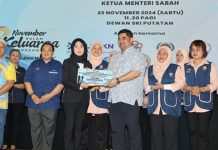KUALA LUMPUR,: The Federation of Chinese Associations Malaysia (Huazong) has called on the government to also lift restriction on manpower (migrant workers included) for economic sectors which are now allowed to carry on business at full capacity.
Its president, Tan Sri T.C Goh urged this while welcoming the announcement by International Trade and Industry Minister Datuk Seri Azmin Ali on Tuesday, that economic sectors allowed to operate at half capacity during phases one to three of the movement control order (MCO) are allowed to carry on business at full capacity from Wednesday (April 29).
He said, this is necessary so that these economic sectors could have sufficient manpower to operate at full capacity as, prior to this they were only allowed to operate at 50% of manpower, after submitting an application complete with workers’ name list to the Ministry of International Trade and Industry (MITI) for its approval.
In a statement issued on Wednesday, he noted that in its announcement made on Tuesday, MITI did not make it clear whether these economic sectors are also allowed to operate at full capacity of workforce. He thus hoped MITI could clarify on this issue, so as to clear the confusion among operators of these economic sectors.
“The government should also ensure that the clinics or Covid-19 care centers appointed by Social Security Organisation (Perkeso) have sufficient capacity, in terms of medical personnel and facilities, to conduct Covid-19 test for workers of these business sectors,” he added.
This is in view of the requirement set by the government requiring workers of these sectors to first undergo Covid-19 test at clinics appointed by Perkeso, before they could resume work. Currently, there are more than 3,000 such clinics throughout the country.
“The government must ensure a smooth Covid-19 test for these workers as, we received feedback from some employers recently, that some of these clinics in certain areas lacked manpower and proper facility to conduct such test.
“Besides this, the government should also clarify on whether migrant workers of these economic sectors which are now allowed to operate at full capacity, too are required to undergo Covid-19 test at these designated clinics, and who should foot the bills?” Goh pointed out.
Meanwhile, he also urged the relevant authorities to clarify on whether those businesses which were allowed to operate two to three days per week, such as the hardware shops, too are now allowed to operate at full capacity, without any restriction on their business hours.
He contended that since the government is now allowing non-essential sectors to operate at full capacity, it should also allowed these businesses to operate at full capacity, and not just a few days per week.
“We also hoped that with the gradual relaxing of the MCO, the government could allow more businesses to reopen, such as wholesale, transportation, auto repair, import-export, trading, and goods suppliers, so as to save jobs and to keep the economy moving,” he added.
He also reiterated that, all businesses which are allowed to reopen must fully comply with the Standard Operating Procedure (SOP) set by the Ministry of Health, in order to ensure a safe working environment for the workers.
Based on MITI’s statement dated April 10, the non-essential sectors allowed to operate during the MCO were:
1. Automotive (limited to completely built-up export units, equipment and components, and aftersales service [maintenance])
2. Machinery and equipment
3. Aerospace
4. Construction and construction-related services, including:
· projects with G1-G2 contractors as main contractors;
· projects with a minimum 90% physical completion;
· tunnelling/maintenance works;
· sloping works;
· emergency works stipulated in contract agreements;
· maintenance, cleaning and drying of stagnant water, as well as spraying of insecticides on construction sites;
· other works that could be dangerous if not completed;
· building projects with an IBS score of 70 and above;
· construction of accommodation facilities for workers, such as centralised employee quarters or employee camps, and professional services involved with the construction industry including architects, town planning, surveyors, material surveyors, project managers, facility managers and others
5. Social health services including registered traditional healthcare services (limited to registered traditional and complementary medicine)
6. Hardware stores, and electrical and electronic appliances stores
7. Full laundry services (self-service not allowed)- pr/BNN






